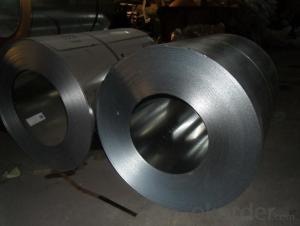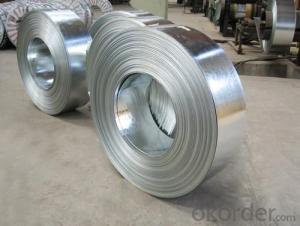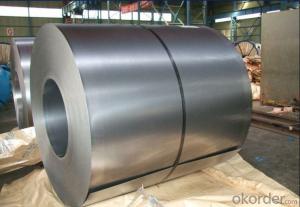Dx51D Z100 Galvanized Steel Coil
- Loading Port:
- China main port
- Payment Terms:
- TT OR LC
- Min Order Qty:
- 5 m.t.
- Supply Capability:
- 100000 m.t./month
OKorder Service Pledge
OKorder Financial Service
You Might Also Like
Item specifice
Dx51D Z100 Galvanized Steel Coil
Specifications
1, Thickness: 0.15-2.00mm
2, Width: 900-1250mm
3, Coil Weight: 3-10 ton
Process of galvanized steel coils
Pay off reel → double cut shear → welder-notcher → entry accumulator → pre cleaning section → furnace → hot bridle → zinc pot → air knife → after cooler → water quench → dryer → skin pass mill → dryer → tension leveler → dryer → chemical coater → chemical oven → cooler → exit accumulator → oiler → exit shear → tension reel.
Plates/Coils/Sheets | |
Commodity | Galvanized Steel Plate/Coils/Sheets |
Material | JISG3302,SGCC,DX51D,Q235 |
Technique | Hot Dipped Galvanized |
Standard | GB,ASTM,JIS,BS,DIN |
Certificate | ISO9001:2008,MTC,BV,SGS |
Price term | FOB,CNF,CIF |
Port of shipment | any Port in China |
MOQ | 40tons |
Delivery time | 7-25days |
Zinc coating | 60-275g/m2(both side) |
Length | 1m-12m or as Client`s Requirment |
Spangle | Zero,Small,Big Spangle |
Width | 400-2000mm |
length | 1-12m |
Thickness | 0.13—3mm |
Coil ID | 508mm/610mm |
Coil Weight | 5-8ton |
Ability | 30000tons/per Month |
Package | Standard Export Package |
Surface | Cromated,Corrugated,Color Coated,etc |
Surface Treatment of Hot Dip Galvanized Steel Sheet/Plate
Surface Treatment | Features |
Chemical passivating treatment | minimize the chance of white rust froming during transit and strorage |
maintain the bright, shiny appearance for a longer time | |
Oils | minimize the tendency for storage and transit stain |
Passivating oils | provide the protection from storage and transit stain by special chemcials called corrosion inhibitors |
- Q:I have a tiara and it oxidized and I'm not sure what material it is. I know it it isn't metal so i was wondering if is steel? Also if it's steel, can I do something to clean it?
- Yes - Steel can oxidize, its most commonly called rust Steel is a metal. Depending on the level of oxidation, you might be able to polish it with very fine steel wool. If is is really bad, then you might need a chemical cleaner such as Naval Jelly, which can be found at the hardware store. But the Naval Jelly might discolor the metal, so then you might need to polish it afterward to return its finish.
- Q:Myself, iam Working In a Steel Fabrication Company. I completed my Engineering in 2006 and immediately recruited in this company in Oman. My company is Steel Fabrication company .So as i am new to this field, i just need some basic knowledge regarding this Steel Fabrication.Waiting for ur early reply.
- make searches on internet; it's the best way to learn.
- Q:What are the different thickness tolerances for steel coils?
- The specific requirements and industry standards can cause the thickness tolerances for steel coils to vary. There are several common thickness tolerances for steel coils: - The standard tolerance ranges from ±0.005 inches to ±0.010 inches. This means that the actual thickness of the steel coil can deviate within this range from the specified thickness. - Stricter tolerances, known as tighter tolerances, may be necessary in certain cases, particularly for critical applications or industries. These tighter tolerances can range from ±0.002 inches to ±0.005 inches, ensuring more precise thickness control for the steel coils. - Custom thickness tolerances can be defined to meet the specific needs of a project or customer. These custom tolerances can be looser or tighter than the standard or tighter tolerances, depending on the application and desired precision level. It is important to consider that different industries and applications may have their own unique tolerance requirements. For example, industries such as automotive or aerospace may demand tighter tolerances due to the critical nature of their applications, while other industries may accept looser tolerances. Additionally, the specific type of steel being used can also affect the acceptable thickness tolerances. Therefore, consulting the relevant industry standards and specifications is crucial in determining the appropriate thickness tolerances for steel coils in a particular application.
- Q:Can steel coils be coated with anti-glare materials?
- Yes, steel coils can be coated with anti-glare materials.
- Q:Can i make holes in iron and steel with somekind of drill bit. All i have is metal drill bits. Mabey like 68 of them but i dont know wich one to use and if they will penetrate.
- That's what drill bits are made for. Those for steel and iron will usually be made of high speed steel. What is important, is the sharpening, and of course, the overall condition of the drill bit. If you need to drill a larger hole, it is helpful to drill a small hole first (pilot drilling), then open it out to size. Never use drill bits you intend to drill iron or steel with to drill such as timber! It will ruin them for steel working.
- Q:I would like to know the process of making steel from the mining of ore to the final product. Can anybody offer some help? Either where to look, or the process itself. I would like to have included the different options with which to make steel. Through scrap metal, or iron ore briquettes etc... Thanks.
- How is steel made? Steel is made via two basic routes - from raw materials - iron ore, limestone and coke by the blast furnace and basic oxygen furnace route or from scrap via the electric arc furnace (EAF) method. The raw material approach is known as the integrated route and about 60% of steel produced today is made by this method. The second technique is much easier and faster since it only requires scrap steel. Recycled steel is introduced into a furnace and re-melted along with some other additions to produce the end product. About 34% of steel produced in 2003 was produced via the EAF route. The first lin contains diagrams of the process (Making Steel)
- Q:How are steel coils inspected for quality assurance?
- Steel coils are inspected for quality assurance through a rigorous process that involves various tests and checks. Firstly, visual inspection is conducted to look for any surface defects such as scratches, dents, or rust. This ensures that the coils are in good condition and free from any obvious flaws. Next, dimensional inspection is performed to verify the dimensions and tolerances of the coils. This involves measuring the width, thickness, and length of the coils to ensure they meet the specified requirements. Any deviations from the standard dimensions are noted and addressed. Additionally, mechanical testing is carried out to assess the strength and durability of the steel coils. This includes conducting tensile tests to measure the strength and elasticity of the steel, as well as impact tests to evaluate its ability to withstand sudden loads or shocks. Furthermore, chemical analysis is conducted to determine the composition and purity of the steel. This involves taking samples from the coils and analyzing them in a laboratory to check for the presence of any impurities or elements that may affect the quality of the steel. To ensure the coils meet specific industry standards, non-destructive testing methods such as ultrasonic testing or magnetic particle inspection may be employed. These techniques allow for the detection of internal defects or irregularities that may not be visible to the naked eye. In addition to these tests, the coils may undergo surface treatment inspections, such as galvanization or coating checks, to ensure the protective layers are applied correctly and meet the required specifications. Overall, steel coil inspection for quality assurance involves a combination of visual, dimensional, mechanical, chemical, and non-destructive testing methods. These comprehensive inspections help to ensure that the steel coils meet the necessary quality standards and are suitable for their intended applications.
- Q:How are steel coils inspected for mechanical properties?
- Steel coils are inspected for mechanical properties through a combination of destructive and non-destructive testing methods. Destructive methods involve conducting tensile, hardness, and impact tests on samples taken from the coils. Non-destructive methods, such as ultrasonic or magnetic particle testing, are also employed to detect surface and internal defects without damaging the coils. These inspections ensure that the steel coils meet the required mechanical specifications for their intended applications.
- Q:How is steel different than iron?How many different kinds of steel are there?What type is the strongest?Which type is the weakest?
- As first answer says, if you look at the number of commercial steel alloys available and consider that any given alloy can be heat treated to a wide range of physical properties, there are thousands and thousands of potential combinations. Technically, steel is an alloy of Fe and C but there are Fe-C alloys that are called cast irons, not steel, and... there are lots of alloy steels which have significant amounts of other elements added like Cr, Ni, Nb, V, Mo, etc. Fe alloys that have a lot of Cr and or Ni added are called stainless steels and there are dozens of them and many of them can be heat treated to produce a wide range of properties. As far as the strongest or the weakest, you have to get really specific about exactly what you mean because some steels are designed for room temperature properties, some are designed for elevated temperature properties, some for static loads, some for impact loads, some for wear resistance, etc, etc.. Steels make up the largest family of metal alloys (by weight and by volume) that humans use. There are a number of reasons for this but the big reasons include: 1) there is a LOT of iron on earth 2) it is relatively cheap to produce 3) you can easily change the physical properties over a every wide range. As an example... you can take a piece of steel that is so brittle it will shatter if you drop it on the floor and heat treat it so you can bend it like a pretzel without cracking and then heat treat it again to make it very strong and tough (resistant to fracture).
- Q:How are steel coils inspected for impact resistance using impact testers?
- Steel coils are inspected for impact resistance using impact testers by subjecting them to controlled impacts of varying force and measuring the resulting deformation or damage. The testers typically consist of a pendulum or a falling weight that strikes the surface of the coil, simulating real-life impacts. The force and velocity of the impact can be adjusted as per the testing requirements. The extent of deformation or damage is then visually assessed or measured using specialized equipment, providing valuable information about the coil's ability to withstand impacts and potential performance in real-world applications.
1. Manufacturer Overview |
|
|---|---|
| Location | |
| Year Established | |
| Annual Output Value | |
| Main Markets | |
| Company Certifications | |
2. Manufacturer Certificates |
|
|---|---|
| a) Certification Name | |
| Range | |
| Reference | |
| Validity Period | |
3. Manufacturer Capability |
|
|---|---|
| a)Trade Capacity | |
| Nearest Port | |
| Export Percentage | |
| No.of Employees in Trade Department | |
| Language Spoken: | |
| b)Factory Information | |
| Factory Size: | |
| No. of Production Lines | |
| Contract Manufacturing | |
| Product Price Range | |
Send your message to us
Dx51D Z100 Galvanized Steel Coil
- Loading Port:
- China main port
- Payment Terms:
- TT OR LC
- Min Order Qty:
- 5 m.t.
- Supply Capability:
- 100000 m.t./month
OKorder Service Pledge
OKorder Financial Service
Similar products
New products
Hot products
Related keywords
































